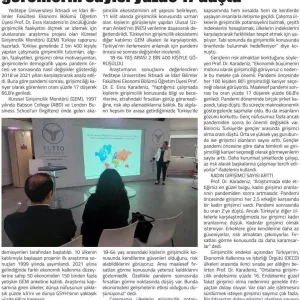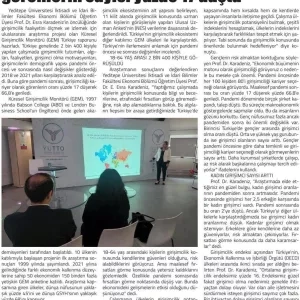Pandemic Intimidated Young Entrepreneurs

Under the leadership of Prof. Dr. Esra Karadeniz, a faculty member of the Department of Economics at Yeditepe University's Faculty of Economics and Administrative Sciences, the Global Entrepreneurship Monitor (GEM) Türkiye report, an international research project aimed at measuring and monitoring entrepreneurial activity, was prepared. In a study conducted with 2,400 people across Türkiye, entrepreneurial attitudes, perceptions, activities, motivations for becoming entrepreneurs, and the demographic structure of entrepreneurs were analyzed by comparing 2018 and 2021 to see how these factors changed before and after the pandemic. According to the findings, after the pandemic, the proportion of those who see entrepreneurship as a career option decreased by 17 percent, dropping to 66.8%.
The Global Entrepreneurship Monitor (GEM) was initiated in 1997 by leading academics from Babson College (USA) and London Business School (UK). The project, which started with the participation of 10 countries, published its first research results in 1999. By 2021, more than 150,000 adults from 50
economies with different levels of economic development had participated in the GEM survey. The countries the research covers represent approximately 45% of the world's population and about 68% of the world's GDP.
Based on the Adult Population Survey (APS) analysis involving 2,400 participants in Türkiye, the changes in entrepreneurial attitudes, perceptions, activities, motivations for becoming entrepreneurs, and the demographic structure of our entrepreneurs before and after the pandemic for the years 2018 and 2021 were analyzed. Moreover, Türkiye was compared with OECD countries, BRICS countries, and all GEM participating countries in the 2021-22 GEM project. Additionally, Türkiye's entrepreneurial ecosystem was evaluated based on the National Expert Survey (NES), which gathered opinions from experts specializing in entrepreneurship across 11 key areas and compared with other participating GEM countries. Changes before and after the pandemic were examined to understand Türkiye's progress in its entrepreneurial ecosystem.
2,400 PEOPLE BETWEEN THE AGES OF 18-64 WERE INTERVIEWED
Prof. Dr. E. Esra Karadeniz, commenting on the research results, said, "In our study, we looked at individuals' knowledge and skills regarding entrepreneurship, whether they could see the opportunities around them, and whether they could take risks. When we combine all these perceptions, we see that people in Türkiye aged 18-64 have confidence in entrepreneurship and can take risks. However, unfortunately, we observed that they fall short in seeing opportunities, especially there has been a decline in spotting opportunities after the pandemic. We think economic developments influence this."
RECOMMENDATIONS ARE MADE ON ENTREPRENEURSHIP
Prof. Dr. Esra Karadeniz explained that the study was conducted to identify the entrepreneurial potential of countries, stating, "The Global Entrepreneurship Monitor (GEM) is an international project and is recognized as the most comprehensive entrepreneurship project in the world. So far, 120 countries have participated in the project. Each country participating in GEM collects two types of data. We surveyed with 2,400 people. This survey represents Türkiye. Secondly, we spoke with 36 experts in entrepreneurship. In our study conducted across Türkiye, we communicated with people living in both rural and urban areas. The study aims to find the entrepreneurial potential of countries, to calculate various indices, to identify differences by comparing the indices of countries, and of course, to provide recommendations on entrepreneurship ultimately."
ENTREPRENEURSHIP IS SEEN AS THE GROWTH ENGINE OF THE ECONOMY
Prof. Dr. Esra Karadeniz mentioned that young people are afraid of taking risks, highlighting the significance of entrepreneurship as the engine of economic growth. "Before the pandemic, 80 out of every 100 individuals viewed entrepreneurship as a career option. Unfortunately, this rate fell by 17 percent after the pandemic to 66.8 percent. Many businesses closed during the pandemic period, and demand decreased. There were deviations in macroeconomic indicators during this period, which intimidated people. Our young population is substantial, but two significant changes have occurred after the pandemic. First, the rate of young people becoming entrepreneurs in Türkiye has decreased.
In contrast, the number of entrepreneurs increased among the middle and higher age groups. Young people have become more cautious than before the pandemic, and the number of those who do not view entrepreneurship as a career option has increased. They prefer to work in more corporate companies, taking less risk and working for others."
NUMBER OF WOMEN ENTREPRENEURS INCREASED
Prof. Dr. Esra Karadeniz highlighted that "The most positive finding from our research is the increase in the rates of female entrepreneurs after the pandemic. Before the pandemic, there was one female entrepreneur for every 2.5 male entrepreneurs. This ratio dropped to 2 after the pandemic.
However, when we compare Turkey with other countries, our rates of female entrepreneurs are low. Women do not want to become entrepreneurs. Compared to men, they have less confidence in themselves and are more hesitant to take risks. They are also more pessimistic about seeing opportunities."
IN TÜRKİYE, WE ARE ENGAGED IN ENTREPRENEURIAL ACTIVITY USING LOW AND MEDIUM-LOW- LEVEL TECHNOLOGIES
Prof. Dr. Esra Karadeniz stated that Türkiye ranks second among the Organisation for Economic Co- operation and Development (OECD) countries in terms of the entrepreneurship index, with an average entrepreneurship index of 16%. "Our index is good, but the reason for becoming an entrepreneur is generally out of necessity. We have many entrepreneurs who want to continue an existing family business. We need to reduce the number of entrepreneurs who start businesses out of necessity and increase the number of those who become entrepreneurs to seize opportunities. We engage in entrepreneurial activities in Türkiye that utilize low and medium-low technologies. We need to change this. Technological advancements are especially significant for increasing efficiency. Turkey has a very high entrepreneurial potential, and to transform this potential into reality, great importance should be given to technology and entrepreneurship education."


